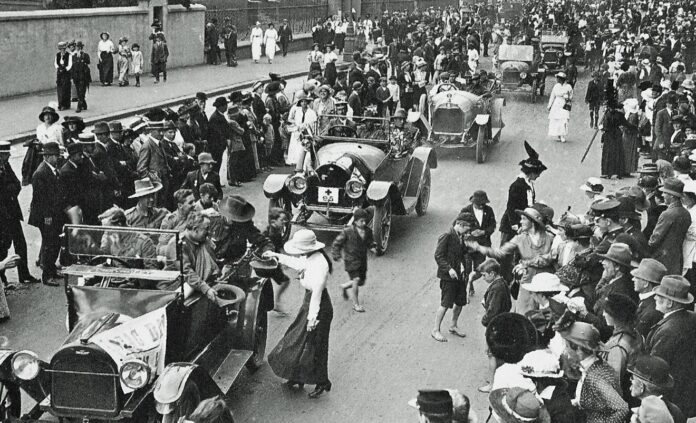Citizen science can be a time machine, with projects that transport you to the past through fragile photographs, ancient artifacts, and hand-written records. In some cases, these items tell stories, filling in missing pieces of our history. Sometimes they hold secrets that may prove to be vital to our future. Why not make some history with this selection of engrossing, time- tripping projects?
Share Smithsonian treasures
US Air Force WASP Pilots (L to R) Frances Green, Margaret (Peg) Kirchner, Ann Waldner and Blanche Osborn) leaving their plane, “Pistol Packin’ Mama,” at Lockbourne AAF in Ohio, c. 1944. Credit: US Air Force, Public Domain.
The Smithsonian is “America’s Attic,” packed with historical artifacts, and someone has to catalog all the items and transcribe all the documents. Little wonder that they’ve turned to an army of “volunpeers” to join the Smithsonian Transcription Center to help them! There are projects in science, art, culture and history that need you!
Stroll through a cemetery
Caroline Nickerson, Executive Director of Florida Community Innovation, welcomes you to the Miami City Cemetery and the Stroll Through the Cemetery project. Credit: Caroline Nickerson.
Every cemetery has hundreds of stories to tell: stories of victories, disappointments, joys and sorrows. They just need someone to tell them. That’s the goal of the Stroll Through the Cemetery project. Just select a name from the City of Miami Cemetery, discover the unsung story of that person and share it with the world.
Be a part of FISHstory
Photos displaying the catch from sport fishing trips can help scientists gauge fish populations and distributions from past decades. Credit: Captain Bob Stone.
Little is known about the history of game fish even as recently as the 1970s. What fish lived where? And how plentiful were they? Fortunately, photographs taken by game clubs and individuals can help scientists track the abundance and range of game fish. The FISHstory project asks you to look over these photographs and count and identify the fish in them. Even if you’re not a fish expert, the FISHstory tutorials make the process fun and easy.
Be a font of information
Finding common elements in the letters of different languages can help scientists trace the development of letter shapes. Credit: Glyph.
Letters, like people, have distinctive histories. And also like people, their shapes change over time. In the Glyph project, you’ll play a game, looking for patterns in groups of letters. For example, answering the question “which of these letters have circles in them?” or “Which letters are the same when you flip them horizontally?” Your work, and that of thousands of other volunteers, will help researchers figure out how the letters in all the world’s languages evolved over thousands of years.
Tell a soldier’s story
New Zealand soldiers walking over a wooden bridge spanning the Ypres Canal heading for the firing line at the Western Front, c. 1917. Credit: Henry Armytage Sanders, Public Domain.
In Measuring the ANZACs you examine the personnel files of soldiers who served in the Australian and New Zealand Army Corp in the early 20th century. Your work will create a rich and complete index of those soldiers, along with a history of their service activities and medical records. The resulting database will be useful for historical and genealogical efforts and medical research.
Source : Discovermagazine














